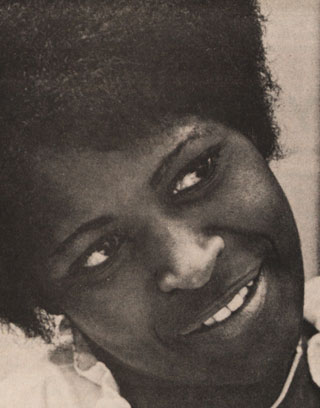
On March 3, 1969, a group of African-American students presented a list of demands to Chancellor Leo W. Jenkins meant to move the campus beyond what seemed to be token efforts at desegregation. The demands were wide-ranging, including, most sensationally, campus bans on “Dixie” and Confederate flags. Often forgotten, however, is that the first demand was for “black instructors,” and the second, for a “Black Studies Program with emphasis on the humanities.” The students added that the first goal – black instructors on campus – was to be met by September 1969.
A contract was soon extended to Dennis Chestnut, an ECU graduate working on a Ph.D. at the University of Utah. However, before Chestnut could complete his doctorate and return to ECU, another African-American scholar, Julia Mae Fields (1938- ), became, in the fall of 1971, the first African-American faculty at ECU. Fields was hired by the English Department to teach Black literature during the 1972-73 academic year. Additionally, she was named ECU’s poet-in-residence.
Fields was a native of Alabama, born and raised on a farm in rural Perry County where, by her own account, she “struggled and fought” for everything she believed in. In 1961, she earned a bachelor’s degree in English from Knoxville College in Tennessee, a small, historically black liberal arts college. Next, she taught high school in Birmingham, while pursuing graduate study at Middlebury College, Vermont, in her summers. In 1963, Fields traveled abroad to study at the University of Edinburgh. In 1968, in recognition for her achievements as a young black poet, she received an award from the National Endowment for the Arts. Four years later, in 1972, shortly after being hired at ECU, Fields completed her master’s degree in English at Middlebury.
During her professional career as a writer-poet-teacher, Fields held a variety of positions. In addition to ECU, she taught at Miles College (Birmingham), the Hampton Institute, St. Augustine’s College, Howard University, North Carolina State University, and the University of the District of Columbia. Her literary oeuvre includes several volumes of poetry, most notably Poems (1968), East of Moonlight (1973), A Summoning, A Shining (1976), and Slow Coins (1981). She also published a children’s book, The Green Lion of Zion Street (1988). Despite her many academic positions and publications, Fields was not, apparently, at home with academic life. In one poem quoted in the Dictionary of Literary Biography, she critiqued the profession with an allusion to “soul-begging pseudo-scholars, prim intellectuals.”
Fields’ work often addressed the black predicament with amusing wit, juxtaposing references to the agrarian trials of black tenants with the refined aesthetics of an urbane, poetically-oriented cognoscenti. One of her best-known poems, “High on the Hog,” conveyed both social critique and an exaggerated celebration of her professional success with humorously matched culinary images. Along with poetry, Fields also wrote plays and fiction. One of her well-known short stories, “Not Your Singing Dancing Spade,” affirmed black identity by exposing the tragic-comic contradictions of a black man trying to move white. Commenting on the Civil Rights movement, Fields, always the poet, remarked that “the day of the created leader is past, a black ranting leader cannot accomplish anything. The only way anything can be accomplished now is through unity.” Via her work as a poet-teacher, Fields sought to realize this new, humanistic vision of leadership and social progress.
Commenting on black literature, Fields characterized it as “a place for discussion which brings together a confrontation of different philosophies and different experiences.” Through her teaching Fields hoped that people would “become more aware and better able to create a better world for all people.” Rejecting the notion that Black literature was simply for black students, Fields stated, “Black Literature is … for any intelligent student who can profit from an increased knowledge of his country.” Unfortunately, Fields’ tenure at ECU lasted only one academic year. Nevertheless, in that time she secured an esteemed place in the history of the institution as its first African-American faculty.
Sources
- "Black Instructor: New Instructor teaches Black Lit." The Fountainhead. Vol. III, no. 7. October 7, 1971. https://digital.lib.ecu.edu/39580
- Bryant, Jacqueline Imani. "Julia Fields (1938- ). In Yolanda Williams Page, ed. Encyclopedia of African American Women Writers, Volume 1. (Westport, Conn.: Greenwood Press, 2007), pp. 202-203.
- "Explanation of Demands." University Archives # 02.06.16.67.01. J. Y. Joyner Library. East Carolina University. Greenville, N.C. https://digital.lib.ecu.edu/10279
- Fields, Julia. I Heard a Young Man Saying. Detroit, Mich.; Broadside Press, 1966.
- _____ . East of Moonlight. Charlotte: Red Clay Books, 1973.
- _____ . A Summoning, A Shining. Scotland Neck, N.C., 1976.
- _____ . Slow Coins. Washington, D.C.: Three Continents, 1981.
- _____ . Green Lion of Zion Street. New York: McElderry Books, 1988.
- "Julia Fields." Oxford Reference. https://www.oxfordreference.com/view/10.1093/oi/authority.20110803095816977
- "Julia Fields, 1938-." Encyclopedia.com. https://www.encyclopedia.com/education/news-wires-white-papers-and-books/fields-julia-1938
- "Julia Fields, 1938-." https://www.lib.ua.edu/Alabama_Authors/?p=1199.
- "List of demands from black students of East Carolina University." University Archives # 02-06-16-26. J. Y. Joyner Library. East Carolina University. Greenville, N.C. https://digital.lib.ecu.edu/10280
- "The Seventh Conrad Kent Rivers Memorial Fund Award." Black World. January 1973. P. 50. https://books.google.com/books?id=MjoDAAAAMBAJ&pg=PA50&lpg=PA50&dq=julia+fields+knoxville+college+bread+loaf+school+of+english&source=bl&ots=-POPGLEqGt&sig=ACfU3U26vHN2F62cL9zrn11rq3R5uUleVQ&hl=en&sa=X&ved=2ahUKEwjXmpK0gsfiAhULPq0KHdGWDvEQ6AEwA3oECAkQAQ#v=onepage&q=julia%20fields%20knoxville%20college%20bread%20loaf%20school%20of%20english&f=false
- "Times Have Changed (and we ain't whistlin' "Dixie!"). The 1974 Buccaneer. Pp. 256-259. https://digital.lib.ecu.edu/10290.
- "Transcript of Dennis E. Chestnut Interview." Donald R. Lennon, interviewer. April 23, 2008. Digital Collections. J. Y. Joyner Library. East Carolina University, Greenville, N.C. https://digital.lib.ecu.edu/text/1254/contract#hit1
Additional Related Material


Citation Information
Title: Julia Mae Fields
Author: John A. Tucker, PhD
Date of Publication: 6/2/2019